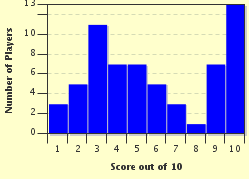Quiz Answer Key and Fun Facts
1. Act I Scene I: Henry Bolingbroke, Duke of Hereford, challenges Thomas Mowbray, Duke of Norfolk, to a duel.
Why does he do this?
2. Act I Scene II: John Gaunt, Duke of Lancaster, tells his widow sister-in-law the Duchess of Gloucester that he will not take a stand against the king for his brother Gloucester's death, despite the king's almost-definite involvement.
Why doesn't he want to stand up to the king?
3. Act I Scene IV: Richard hears that John Gaunt is dying and is quite pleased!
Why does he want his uncle to die quickly?
4. Act II Scene I: John Gaunt, dying, wishes to try to give advice to the king before expiring. His brother, the Duke of York, tells him not to bother with worrying about that.
Why is York so down on the idea of his brother advising the king?
5. Act II Scene III: In this scene, Lord Berkeley enters to Henry Bolingbroke, who has returned from exile before his time is up, and asks to speak to "My Lord of Hereford". Henry gets upset at being addressed in this way by Lord Berkeley.
Why is Henry Bolingbroke so annoyed at Berkeley for calling him "My Lord of Hereford"?
6. Act III Scene I: Henry Bolingbroke kills two of Richard's men - Lord Bushey and Lord Green. He gives a whole litany of reasons for killing them before he does so, to make sure everyone knows it's justified.
Which is NOT A SPOKEN REASON why he kills Bushey and Green?
7. Act III Scene II: Richard returns from the war in Ireland to a nation at war with itself - Henry is on the march with an army and wants to claim his right to break his exile. It's dangerous, and Richard despairs. But his followers reassure him, and he wavers many times between hope and desperation.
He finally settles on "desperation" for his final mood change - what is the final straw?
8. Act IV Scene I: Richard is finally deposed and replaced as king by Henry Bolingbroke. At one point, Richard calls for a mirror during this intense political procedure.
Why on earth does he ask for a mirror?
9. Act V Scene II: The Duke and Duchess of York are discussing the parade where new king Henry IV was cheered and Richard jeered in the streets of London. Their son, former Duke Aumerle and now demoted Earl of Rutland, appears and the Duke of York reads a paper that Rutland has on his person. He is then very, very upset.
Why does the paper upset York so much?
10. Act V Scene VI: Henry IV puts down several of his enemies and now seems safer than ever on the throne. However, when Harry Percy presents him the Bishop of Carlisle, a known enemy, alive, Henry does not have Carlisle killed.
Why does he keep Carlisle alive?
Source: Author
merylfederman
This quiz was reviewed by FunTrivia editor
looney_tunes before going online.
Any errors found in FunTrivia content are routinely corrected through our feedback system.

